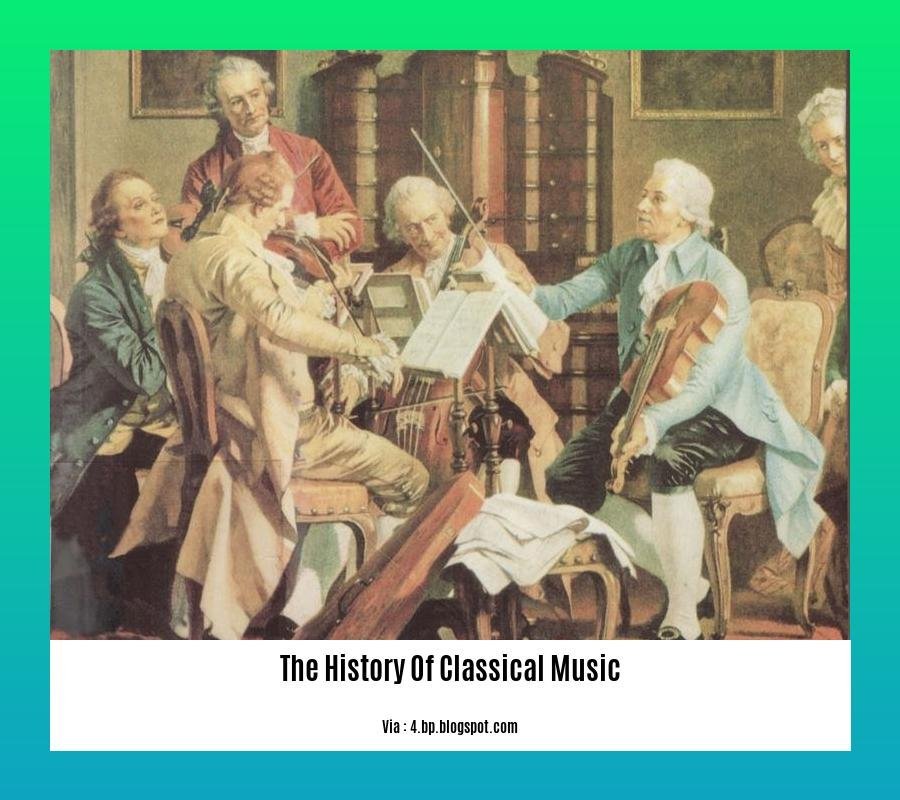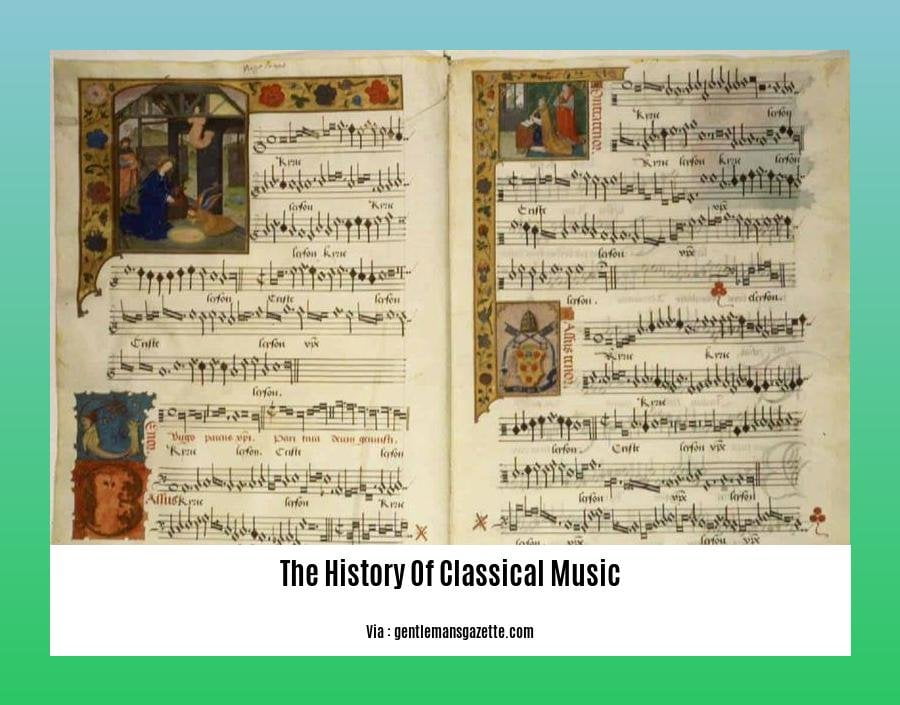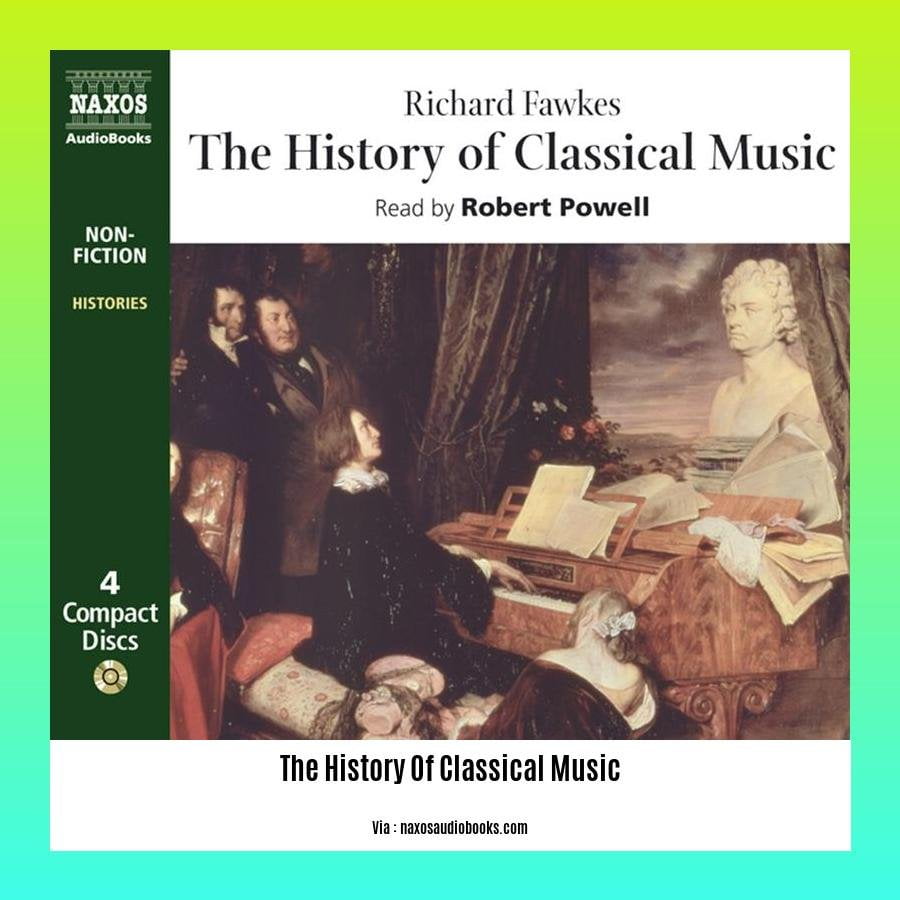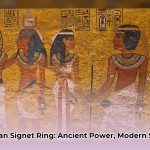In the realm of music, few genres can rival the grandeur and timelessness of classical music. Its rich history spans centuries, encompassing diverse cultures and eras, each leaving an indelible mark on the evolution of sound. Join us on a captivating journey through The History of Classical Music: A Journey Through Time and Sound, where we’ll explore the iconic composers, groundbreaking masterpieces, and fascinating stories that have shaped this enduring art form.
Key Takeaways:
The history of classical music spans nearly 1000 years, beginning near the end of the 10th century to the present day.
Its roots lie in early Christian liturgical music, which was influenced by ancient Greek music.
The history of classical music can be divided into six periods:
- Medieval (1150 – 1400)
- Renaissance (1400 – 1600)
- Baroque (1600 – 1750)
- Classical (1750 – 1820)
- Romantic (1820 – 1900)
- 20th and 21st centuries (1900 – 2000, 2000 – present)
The History of Classical Music:

With a history stretching back over a millennium, the history of classical music is an expansive and diverse tapestry of artistry and innovation, blending influences from ancient Greece, Gregorian chant, and Renaissance polyphony to shape the rich soundscape we know today. As we embark on a journey through time, let’s explore the major eras of the history of classical music and delve into the lives and works of the great composers who left an indelible mark on the genre.
Medieval Period (1150–1400): Laying the Foundation
- The roots of the history of classical music lie in the sacred music of the medieval church.
- Gregorian chant, with its simple melodies and devotional texts, laid the groundwork for the development of polyphony, where multiple independent melodic lines interweave to create a rich tapestry of sound.
Renaissance Period (1400–1600): A Time of Innovation
- The Renaissance ushered in a period of experimentation and innovation in the history of classical music.
- Polyphony flourished, reaching new heights of complexity with the works of composers such as Josquin des Prez and Palestrina.
- Secular music also gained prominence, with the rise of the madrigal, a type of polyphonic vocal music often depicting love, nature, and other worldly themes.
Baroque Period (1600–1750): Drama and Virtuosity Take Center Stage
- The Baroque era marked a dramatic shift in the history of classical music.
- Composers such as Bach, Handel, and Vivaldi embraced the concept of musical drama, using music to convey emotions and tell stories through their works.
- Virtuosity became a defining characteristic of the period, with composers writing increasingly challenging pieces to showcase the talents of their performers.
Classical Period (1750–1820): Order, Balance, and Refinement
- The Classical period brought a return to order, balance, and refinement in the history of classical music.
- Composers like Haydn, Mozart, and Beethoven emphasized clarity, structure, and thematic development in their works.
- The symphony and the sonata emerged as prominent musical forms, showcasing the interplay of melody, harmony, and counterpoint.
Romantic Period (1820–1900): Emotion, Passion, and Individual Expression
- The Romantic era ushered in a period of intense emotion, passion, and individual expression in the history of classical music.
- Composers such as Schubert, Chopin, and Tchaikovsky embraced personal expression and subjective experiences, often inspired by literature, nature, and the human condition.
- The orchestra expanded in size and complexity, allowing composers to create richer and more colorful soundscapes.
20th and 21st Centuries (1900–Present): A Century of Innovation and Experimentation
- The 20th and 21st centuries have witnessed a multitude of styles and innovations in the history of classical music.
- Composers like Stravinsky, Schoenberg, and Cage pushed the boundaries of tonality, rhythm, and form, creating works of unprecedented complexity and originality.
- Electronic music, minimalism, and multimedia performances have all emerged as influential trends, shaping the landscape of contemporary classical music.
Throughout the history of classical music, the interplay of tradition and innovation has driven the genre forward, resulting in a vast and diverse body of work that continues to inspire and captivate audiences worldwide. From the contemplative chants of the medieval period to the experimental soundscapes of the modern era, the history of classical music is a testament to the enduring power of human creativity and expression.
What do you know about the inception and evolution of everyone’s favorite sweet treat? Find out more about the history of cookies.
Have you ever wondered when and how our beloved genre of literature came into being? Learn more about the history of science fiction.
Curious about the rise of the global phenomenon that is table tennis? Read all about the history of table tennis.
Classical Music History

Welcome to a historical odyssey through the evolution of classical music—a journey that spans centuries and continents. This genre of music has left an enduring legacy, captivating audiences with its intricate melodies, complex harmonies, and evocative compositions.
Key Takeaways:
- Medieval Period (1150-1400):
Embraced sacred music, such as Gregorian chant, which laid the foundation for Western music. - Renaissance Era (1400-1600):
Flourished with the emergence of polyphony and the rise of secular music, paving the way for the development of opera and instrumental music. - Baroque Period (1600-1750):
Ushered in elaborate ornamentation, intense contrasts, and the birth of opera, exemplified by composers like Bach and Handel. - Classical Period (1750-1820):
Brought balance and clarity to musical compositions, with emphasis on form and structure, as seen in the works of Mozart and Haydn. - Romantic Era (1820-1900):
Embraced emotional intensity, programmatic music, and the rise of virtuoso performers, with composers like Beethoven, Schubert, and Chopin leading the way. - 20th and 21st Centuries (1900-Present):
Explored new frontiers with atonality, serialism, and minimalism, reflecting the diverse musical trends and innovations of modern times.
Additional Insights:
- Influence of Patrons:
The patronage of wealthy individuals and institutions played a crucial role in supporting and nurturing classical music’s development. - Evolution of Instruments:
The refinement and invention of musical instruments, such as the piano and the violin, greatly influenced the sound and capabilities of classical music. - Cultural Exchange:
Classical music transcended borders, with composers and musicians traveling and exchanging ideas, leading to a rich tapestry of musical influences. - Enduring Impact:
Classical music has stood the test of time, inspiring contemporary genres, film scores, and popular culture, proving its timeless appeal.
Sources:
– The History of Classical Music: A Timeline
– A Brief History of Classical Music
Classical Music Composers: Masterpieces Through the Ages
Classical music is a magnificent genre that has captivated hearts and souls for centuries. It’s an intricate tapestry woven by the brilliance of composers who have left an indelible mark on the world of music. Let’s embark on a journey to discover the lives and works of some of the most celebrated classical music composers.
Key Takeaways:
Ludwig van Beethoven:
German composer who revolutionized classical music with his innovative works spanning symphonies, sonatas, and concertos.
- Known for his iconic “Für Elise” and “Symphony No. 9.”
His music is characterized by emotional intensity, dramatic contrasts, and innovative use of harmony and form.
Johann Sebastian Bach:
German composer, organist, and harpsichordist of the Baroque era.
- Master of counterpoint and fugue, his works include “The Well-Tempered Clavier” and “Brandenburg Concertos.”
His music is renowned for its intricate structures, mathematical precision, and profound emotional depth.
Wolfgang Amadeus Mozart:
Austrian composer who displayed prodigious talent from a young age.
- Composed operas, symphonies, concertos, and chamber music that continue to captivate audiences worldwide.
- Known for his melodic genius, structural clarity, and ability to effortlessly blend diverse musical elements.
The Legacy of Classical Music Composers
These classical music composers and countless others have left an enduring legacy that continues to shape our understanding of music. Through their groundbreaking compositions, they have pushed the boundaries of creativity and innovation, leaving us with a treasure trove of musical masterpieces.
Appreciating Classical Music Today
Classical music isn’t just a relic of the past; it’s a living art form that continues to evolve and captivate audiences. Whether through live performances, recordings, or film scores, classical music permeates our lives, enriching our understanding of history, culture, and human emotion.
Sources:
- The Greatest Composers of Classical Music
- The 10 Greatest Classical Composers of All Time
FAQ
Q1: What are the six periods of classical music history?
A1: The six periods of classical music history are:
1. Medieval (1150-1400)
2. Renaissance (1400-1600)
3. Baroque (1600-1750)
4. Classical (1750-1820)
5. Romantic (1820-1900)
6. 20th and 21st Century (1900-present)
Q2: Which composers are considered the most influential in the history of classical music?
A2: Some of the most influential composers in the history of classical music include:
1. Ludwig van Beethoven
2. Johann Sebastian Bach
3. Wolfgang Amadeus Mozart
4. Frederic Chopin
5. Pyotr Tchaikovsky
Q3: What are some of the most famous classical music compositions?
A3: Some of the most famous classical music compositions include:
1. Beethoven’s “Für Elise”
2. Mozart’s “Eine kleine Nachtmusik”
3. Bach’s “Brandenburg Concertos”
4. Tchaikovsky’s “1812 Overture”
5. Chopin’s “Nocturne in E-flat major, Op. 9, No. 2”
Q4: How has classical music changed over time?
A4: Classical music has changed over time in several ways, including:
1. Changes in musical style and form
2. The development of new instruments and techniques
3. The influence of different cultures and traditions
4. The rise of new genres and subgenres
Q5: What is the future of classical music?
A5: The future of classical music is uncertain, but several trends suggest that it will continue to thrive and evolve:
1. The increasing popularity of classical music education
2. The development of new technologies for creating and performing classical music
3. The growing interest in classical music from new audiences around the world
4. The ongoing efforts of composers and performers to create new and innovative works










